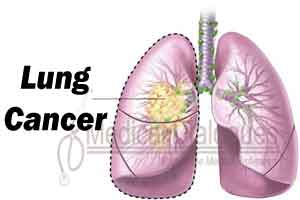- Home
- Editorial
- News
- Practice Guidelines
- Anesthesiology Guidelines
- Cancer Guidelines
- Cardiac Sciences Guidelines
- Critical Care Guidelines
- Dentistry Guidelines
- Dermatology Guidelines
- Diabetes and Endo Guidelines
- Diagnostics Guidelines
- ENT Guidelines
- Featured Practice Guidelines
- Gastroenterology Guidelines
- Geriatrics Guidelines
- Medicine Guidelines
- Nephrology Guidelines
- Neurosciences Guidelines
- Obs and Gynae Guidelines
- Ophthalmology Guidelines
- Orthopaedics Guidelines
- Paediatrics Guidelines
- Psychiatry Guidelines
- Pulmonology Guidelines
- Radiology Guidelines
- Surgery Guidelines
- Urology Guidelines
Lung cancer guideline Udpated: Checkout details

Denver, CO: Rapid advancements in the molecular diagnostic testing of lung cancer have led to new treatments and greater hope for patients battling lung cancer, the most common cause of cancer death worldwide.
To ensure that clinicians stay apace and provide optimal patient care, three leading medical societies-- the College of American Pathologists (CAP), the International Association for the Study of Lung Cancer (IASLC), and the Association for Molecular Pathology (AMP)--have updated their 2013 evidence-based guideline.
Published today in early online release, the "Updated Molecular Testing Guideline for the Selection of Lung Cancer Patients for Treatment with Targeted Tyrosine Kinase Inhibitors," continues to set standards for the molecular analysis of lung cancers for test results that effectively guide targeted therapy and treatment.
Targeted cancer therapies are drugs or other treatments that block the spread of cancer by interfering with specific molecules that spur that specific cancer's growth and progression. Patients whose tumors harbor certain, specific molecular alterations may be candidates for targeted tyrosine kinase inhibitor (TKI) therapy, which may improve survival and quality of life.
"Several factors influenced this update, which builds on the guidance we set forth in 2013," said Neal Lindeman, MD, director of Molecular Diagnostics at Brigham and Women's Hospital and Associate Professor of Pathology at Harvard Medical School in Boston, and AMP member. "Clinical practice guidelines must continually assess new evidence as it accumulates and consider new testing technologies as they emerge."
Dr. Lindeman led the international, multidisciplinary panel of expert authors appointed by each of the three organizations. The panel included pathologists, oncologists, pulmonologists, a methodologist, laboratory scientists, and patient representatives who collaborated to develop the guideline following the Institute of Medicine's evidence-based process.
The updated guideline strengthens or reaffirms the majority of the 2013 recommendations for patients with lung adenocarcinoma, and also recommends testing for some new genes. Most notably:
- Testing for ROS1 mutations is new and strongly recommended for all lung cancer patients regardless of clinical characteristics.
- Multiplexed genetic sequencing panels (e.g., NGS testing) are preferred over multiple single-gene tests to identify other treatment options beyond EGFR, ALK, and ROS1, however single gene assays are still acceptable.
- When NGS is performed, several other genes are also recommended - BRAF, ERBB2, MET, RET, and KRAS. However, these genes are not essential when only single gene tests are performed. Note: BRAF had late-breaking early evidence, which we expect to mature to a stronger recommendation for inclusion as a single gene assay, as well, in the near future.
- Testing in relapse is required for EGFR (T790M), but not for ALK, as the differential sensitivities of second-line ALK inhibitors in the setting of specific acquired mutations in ALK has not yet sufficiently matured and is still investigational.
- Testing for EGFR T790M in relapse may be done by biopsy or cell-free circulating DNA. However cellfree DNA is not appropriate for initial diagnosis at this time, unless a tissue or cytology sample cannot be obtained.
- Previous recommendations, otherwise, were largely reinforced, with some strengthening of evidence that has led to strengthening of the original recommendations. Most notable changes:
- Inclusion of IHC for ALK as an alternative to FISH;
- Inclusion of any cytology sample with adequate cancer content, as opposed to recommending cell blocks.
- Opinion is expressed that samples should also be set aside for assays to predict response to immunotherapy (e.g., PD-L1 IHC), but no specific recommendations about how to predict this treatment response were made, and will be the subject of an upcoming guideline.
To read the article, click on the given link
https://doi.org/10.5858/arpa.2017-0388-CP

Disclaimer: This site is primarily intended for healthcare professionals. Any content/information on this website does not replace the advice of medical and/or health professionals and should not be construed as medical/diagnostic advice/endorsement or prescription. Use of this site is subject to our terms of use, privacy policy, advertisement policy. © 2020 Minerva Medical Treatment Pvt Ltd